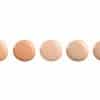Key Points
-
Building a customized skincare routine is vital to your skin's health.
-
You don't need to overhaul your skincare routine at the turn of seasons but simply make seasonal adjustments.
-
The right skincare products/habits depend on your unique skin.
Your skin has a mind of its own, and it gets angry when overfed with irritating products with harsh ingredients.
Some skin is more susceptible to annoying and unsightly skin conditions than others. Since your skin is unique, building a customized skincare routine is essential.
Identifying Your Skin Type
Knowing your skin allows you to build a skincare routine that won't cause your skin to turn on you. Say yes to the right products and no to the not-so-friendly products by understanding dry, oily, combination, and sensitive skin.
Dry Skin
Dryness in skin craves an oasis like one does in a desert. The skin doesn't make enough natural oils (sebum) to protect and moisturize the epidermis.
Dry skin looks and feels dull, cracked, tight, flaky, and rough. It makes fine lines and wrinkles more apparent and causes red patches.
Oily Skin
Oily skin churns out too much sebum, creating a shiny and greasy complexion. Excess sebum may clog pores, making them larger and more prone to breakouts.
Combination Skin
Combination skin is a mixture of dry and oily skin and typically creates an oily T-zone — forehead, nose, and chin — while other areas remain dry.
Sensitive Skin
Some people are born with sensitive skin, while others develop it.
Sensitive or reactive skin quickly acts out when exposed to triggers such as dyes, fragrances, soaps, skincare products, or the weather.
Sensitive skin has many symptoms, including dryness, redness, itchiness, hives, or rashes. If your skin is sensitive, you may feel a burning, tingling, or stinging sensation.
Normal Skin
Normal skin is rare; it's neither too dry nor too oily.
Find your skin type and build your custom routine today.
Customizing Cleansers
Cleansers are a vital part of any skincare routine.
The best face washes for oily or combination skin are the foaming and gel-based cleansers. Look for a lightweight, hydrating foaming wash to prevent over-stripping your oily or combination epidermis of its natural oils.
Cream and oil-based cleansers are usually best for dryness. When looking for tailored cleansers, ensure it's gentle and fragrance-free if you have sensitive skin. If you have eczema, look for cleansers accepted by the National Eczema Association.
Consider shying away from cleansers with active ingredients, especially if your other skincare products in your routine contain active ingredients. Using too many active ingredients simultaneously can irritate your skin.
If you opt for a cleanser with active ingredients that target acne, keep it on for a few minutes; rinsing away the solution too soon risks losing the beneficial ingredients.
The best product for your skin is a tailored cleanser for your particular skin type.
Moisturizers for Every Skin Type
Moisturizing is necessary for any skincare routine to hydrate your skin.
Thick oil-based creams and ointments work best for dry skin. Look for humectants like hyaluronic acid or glycerin and emollients like ceramides and squalane.
Lightweight, oil-free lotions and gels are the best bet for oily skin.
For combination skin, search for a hydrating product that is not too thick. Another option includes using two moisturizers — one gel-based for the oily T-zone and one cream-based for the drier parts of your face.
Stick to fragrance-free moisturizers containing minimal ingredients if you have sensitive skin.
Treatment Products
Retinol and retinoids are the best treatment products for oily and acne-prone skin.
These vitamin A derivatives penetrate multiple layers, accelerating the cell turnover process and promoting collagen and elastin production. These products prevent the formation of new pimples and minimize the appearance of acne scars.
Retinols/retinoids also serve mature-looking skin because they diminish the appearance of fine lines and wrinkles. They also reverse sun damage, reduce the appearance of pores, and improve skin texture and tone.
These treatments are suitable and safe for all types of skin but cause temporary side effects like dryness, irritation, redness, burning, and flakiness.
Introduce retinol slowly; start with a low concentration and apply twice a week until your skin adjusts.
Exfoliation
There are two kinds of exfoliation methods: mechanical and chemical exfoliation. Mechanical exfoliation involves using a scrub or another device to slough away dead skin cells. Chemical exfoliation uses alpha or beta hydroxy acids to break down dead skin cells.
Many dermatologists aren't fans of mechanical exfoliation methods because they find them too abrasive and harsh for the skin.
If your skin is oily, limit exfoliation to two to three times per week. If you have dry or sensitive skin, consider exfoliating twice a week as long as your skin can handle it.
Exfoliation isn't for everyone, and people with ultra-sensitive skin might be unable to tolerate it. If it's doing more harm than good, skip exfoliation. Your skin naturally sheds dead skin cells every day.
It's essential to consider your other skincare products before exfoliating. Some products have exfoliating properties, and using another exfoliator may damage your skin.
Adjusting Your Skincare Routine Seasonally
Adapting to climate and environmental changes doesn't require a complete about-face. Plus, looking for new products suitable for your skin is often costly and time-consuming.
On her YouTube channel, Houston-based dermatologist Dr. Andrea Suarez says, "Changing up your routine and trying to introduce new products sometimes that can end up causing irritation for your skin, it's unnecessary, [and] ends up drying out your skin…"
If your skin needs extra TLC during certain seasons, make a few adjustments to your routine and lifestyle habits.
Summertime isn't the best season for those with oily or acne-prone skin. Sweating is normal but can trigger breakouts. High humidity and heat in summer cause the skin to produce more sebum, and sweat mixes with excess oil and clogs pores.
While sweatbands are popular on hot, sweaty days, they cause friction and irritate skin. The pressure from the sweatband combined with the heat and sweat lead to unexpected pimples called acne mechanica. Sweatbands and hats also trap pore-clogging bacteria on the face, leading to breakouts.
Acne doesn't only target your forehead during the summer — tight clothing also accelerates breakouts via friction.
To prevent zit flare-ups during hot weather, stay in cool, shaded areas and wash your skin as soon as possible after sweating. Wear light, loose, and breathable clothes that don't constantly rub against the skin or trap in sweat.
Wash your headbands, caps, and clothes regularly. Invest in a water-resistant, broad-spectrum sunscreen so it doesn't drip down your face while sweating or swimming. Don't forget to reapply as needed.
In the wintertime, the cold air, harsh winds, and low humidity levels dry out your skin by stripping it of its natural, vital oils. During cold weather, dry skin may also turn oily, producing more sebum to compensate for the lack of hydration.
Other seasonal adjustments include cleansing less frequently to avoid over-stripping and drying out the skin and switching to a thicker or heavier moisturizer, especially during a harsh winter season.
An easy adjustment to make during winter is washing your face with a cleanser at night and skipping the morning cleanse.
Consider taking fewer showers and baths to avoid drying out your skin. Also, try keeping your shower time under 10 minutes to prevent over-stripping your skin of its natural lipids and oils. Try using lukewarm water and avoid washing your face and body with hot water.
Dermatologists also recommend investing in a humidifier to restore moisture to the air to keep your skin from losing water.
Customize Your Routine
The first step for building a custom skincare routine is identifying your skin type. It's always a good idea to visit a dermatologist, as skin experts can recommend the best skincare products and healthy habits for your unique skin.
Visit CosmeticsCenter for all of your skincare guidance.










